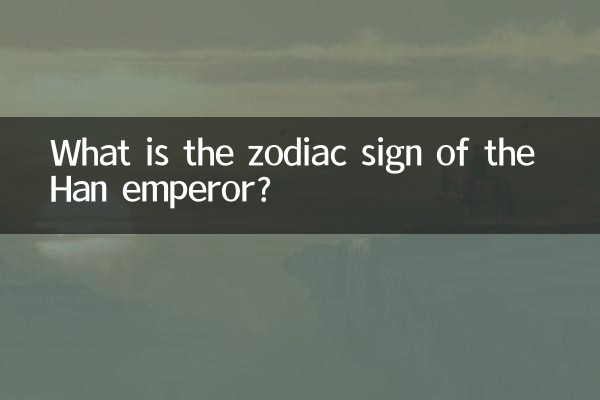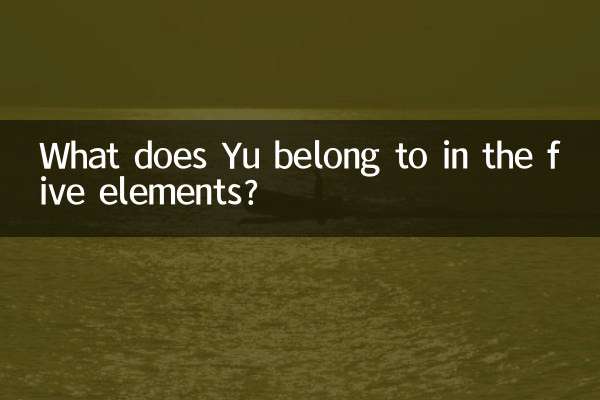What was the zodiac sign of the emperor of the Han Dynasty: cultural interpretation from history to hot topics
Recently, the topic of "What is the zodiac sign of the emperor of the Han Dynasty?" has aroused heated discussions on social media and historical and cultural forums. This topic involves both traditional Chinese zodiac culture and historical research on the emperors of the Han Dynasty. This article will conduct a structured analysis of this cultural phenomenon based on hot data from the entire network in the past 10 days.
1. Network-wide popularity analysis (data in the past 10 days)

| Platform | Amount of related topics | highest heat index | Main discussion angle |
|---|---|---|---|
| 12,000 items | 856,000 | Zodiac Culture Interpretation | |
| Zhihu | 430 articles | 723,000 | Historical research |
| Douyin | 560 videos | 12 million views | Interesting science |
| Station B | 89 videos | 3.5 million plays | In-depth analysis |
2. Textual research on the zodiac signs of the main emperors of the Han Dynasty
| emperor | Reigning time | guess zodiac sign | According to source |
|---|---|---|---|
| Han Gaozu Liu Bang | 202 BC-195 BC | snake | "Historical Records" birth year calculation |
| Emperor Wu of Han Dynasty Liu Che | 141 BC-87 BC | monkey | Chronological comparison in "Hanshu" |
| Liu Xiu, Emperor Guangwu of Han Dynasty | 25-57 years | chicken | "Book of the Later Han" records and calculations |
| Emperor Xian of Han Dynasty Liu Xie | 189-220 | sheep | Supplementary Records of the Three Kingdoms |
3. Recent hot-related content
In the past 10 days, hot topics related to "Zodiac of the Emperor of the Han Dynasty" have mainly focused on the following aspects:
1.Influence of film and television works: The portrayal of Liu Bang's image in the recently aired historical drama "Song of the Wind" has triggered discussions among the audience about his zodiac sign.
2.Cultural and creative product boom: The "Zodiac of Emperors of the Han Dynasty" series of cultural and creative products launched by the Palace Museum set a sales record on e-commerce platforms.
3.academic controversy: A professor from a university published a paper questioning the traditional zodiac calculation method, which caused widespread discussion in the academic community.
4.Interpretation of zodiac signs: Multiple horoscope and numerology accounts combine the zodiac signs of the Han Dynasty emperors with fortune predictions for 2024 to form cross-field topics.
4. Interpretation of cultural phenomena
The rising popularity of "What is the zodiac sign of the emperor of the Han Dynasty" reflects several cultural characteristics of contemporary Chinese society:
First,Modern transformation of historical and cultural IPThe trend is obvious, traditional content is getting new life through new media forms. Secondly,The lasting influence of zodiac culture, indicating that folk traditions still have strong vitality in modern society. Furthermore,Entertainment dissemination of knowledge popularization, enabling professional historical research to reach the public in a more accessible way.
5. Folk interpretation of zodiac signs and emperor’s character
| zodiac sign | Character traits | Corresponding to the emperor | Folk evaluation |
|---|---|---|---|
| snake | Foresight | Liu Bang | It is consistent with the legend of "White Snake Rebellion" |
| monkey | witty and changeable | Liu Che | In line with Emperor Wu’s reform image |
| chicken | Diligent and punctual | Liu Xiu | Echoing the achievements of ZTE Han Dynasty |
| sheep | gentle and submissive | Liu Xie | It fits the situation of the puppet emperor in the late Han Dynasty |
Conclusion
"What is the zodiac sign of the emperor of the Han Dynasty?" This seemingly simple question actually contains rich cultural connotations. Judging from the recent popularity of the Internet, the combination of historical topics and folk culture is producing new communication effects. This cross-border cultural discussion not only enhances the public's understanding of history, but also provides new ideas for the innovative development of traditional culture in modern society.
This hot phenomenon shows that when professional historical research and public interest points are appropriately combined, a win-win situation of academic value and communication effect can be achieved. We look forward to seeing more similar high-quality cultural topics emerge in the future to promote the creative transformation and innovative development of Chinese traditional culture.

check the details

check the details